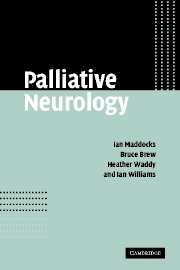Book contents
- Frontmatter
- Contents
- Foreword
- Note on drugs and abbreviations
- Section I Palliative Management
- Section II Major discomforts in advanced neurological illness
- Section III Major neurological conditions requiring palliation
- Section IV Ethical issues
- 1 Consent and decision-making
- 2 Advance directives
- 3 Proxy decision-making
- 4 Ethical issues in states of disordered consciousness
- 5 Terminal sedation
- 6 Euthanasia
- Section V Appendices
- Index
1 - Consent and decision-making
from Section IV - Ethical issues
Published online by Cambridge University Press: 08 January 2010
- Frontmatter
- Contents
- Foreword
- Note on drugs and abbreviations
- Section I Palliative Management
- Section II Major discomforts in advanced neurological illness
- Section III Major neurological conditions requiring palliation
- Section IV Ethical issues
- 1 Consent and decision-making
- 2 Advance directives
- 3 Proxy decision-making
- 4 Ethical issues in states of disordered consciousness
- 5 Terminal sedation
- 6 Euthanasia
- Section V Appendices
- Index
Summary
Consent must be informed; it is a response to knowing the facts. Many of the facts in terminal illness are potentially sad and disturbing, but there is no justification for deliberately withholding information that will allow genuine informed consent.
The right to refuse treatment
In advanced neurological conditions there are a number of common situations in which continuation of life may depend on particular medical interventions. These include the performance of a gastrostomy to maintain nutrition in those unable to swallow, the provision of assisted ventilation for those whose respiratory function is severely impaired, or the treatment with antibiotics of an incidental infection (often respiratory).
In the judgement of some, if refusal of treatment leads to more rapid death, it ought not be allowed. In the opinion of others (including some governments), a patient can refuse medical treatment, but not the provision of food and drink if its refusal will lead to death, even if this is being administered by an ‘artificial’ route (intravenous (I-V), percutaneous endoscopic gastrostomy (PEG) and naso-gastric tube). This creates a distinction between nourishment and hydration on the one hand and the administration of drugs or surgery on the other. Still other persons and governments state that any patient has the right to refuse any medical intervention, even one that is regarded as the only way to sustain life.
The matter is made more complex by requiring a definition of ‘medical treatment’ or of ‘artificial means’.
- Type
- Chapter
- Information
- Palliative Neurology , pp. 203 - 204Publisher: Cambridge University PressPrint publication year: 2005



